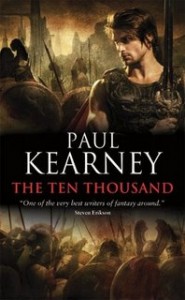The 10K
Friday, May 29, 2009
posted by Steve Trout
 Print This Post
Print This Post

There is no literary work, to me, half as zestful as rewriting history in the guise of fiction. Every page of history teems with dramas that should be put on paper . . . — Robert E. Howard
Apparently Paul Kearney has a similar outlook when it comes to rewriting history, since his latest book, The Ten Thousand (Solaris, 2008), is a retelling of historical events. More specifically it is the Anabasis of Xenophon, the story of a large mercenary army recruited to fight in Persia around 450 BC, and then left to fight their way home, transplanted to a fantasy world.
On Kearney’s fictional world of Kuf, mankind shares the planet with two other humanoid species, the tall, yellow-eyed and gold-skinned Kufr and the yeti-like Qaf. The Kufr have the world-spanning Empire, and stand in for the Persians. The humans have a smaller continent to the West, and are called Macht. They are clearly Greco-Roman in culture, war-like, with city-states fighting amongst the ruins of a fabled empire of their own.
As you might expect from a story based on history, there is little magic or fantasy aside from the setting. The Macht have some magical armor, supposedly derived from their gods, but that is about it.
Some critics have compared Kearney to David Gemmell, but I think they are worlds apart. In a Gemmell book, virtue will always triumph, if at a cost. In Kearney’s work it is far less easy to tell where the virtue lies, let alone if it will win. The Macht mercenaries in this book, for example, are our protagonists, but they have come to a peaceful land for the express purpose of waging war on behalf of a usurper. When he dies in battle, the mercenaries try to broker a truce so that they can return home, but the emperor wants nothing but their destruction and treacherously assassinates the generals sent as ambassadors. It’s almost like Howard remarked about one of his Crusader stories, “all the characters complete scoundrels, and everybody double-crossing everybody else.” Well, not quite. Some of the characters have a sense of honor, insofar as their lives make it possible.
I did not like this book as much as I enjoyed The Monarchies of God series, but it was well worth the time. Recommended for readers who enjoy the military fantasies of Glen Cook or David Drake.
Interestingly, I learned the 1979 cult favorite movie The Warriors was also loosely based on the Anabasis, and director Walter Hill wanted to have the audience be aware of its Greek roots, but the executives said no. A remake is in the works, as if we needed one.
